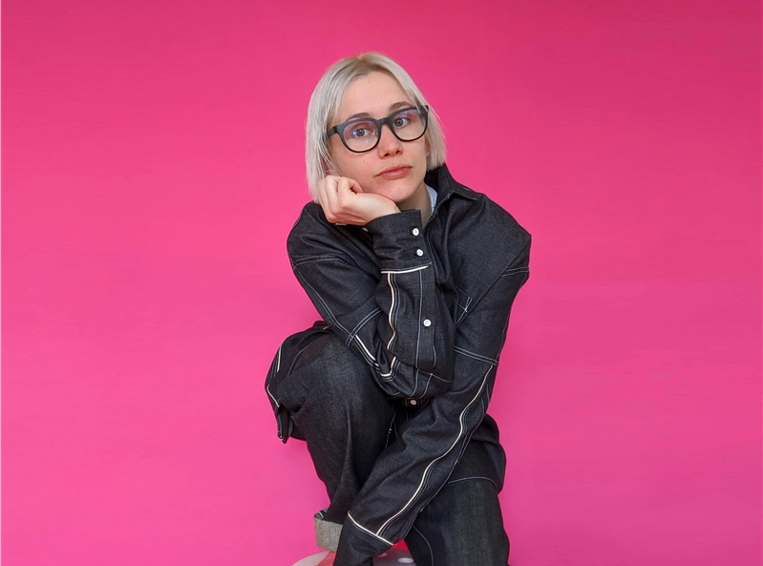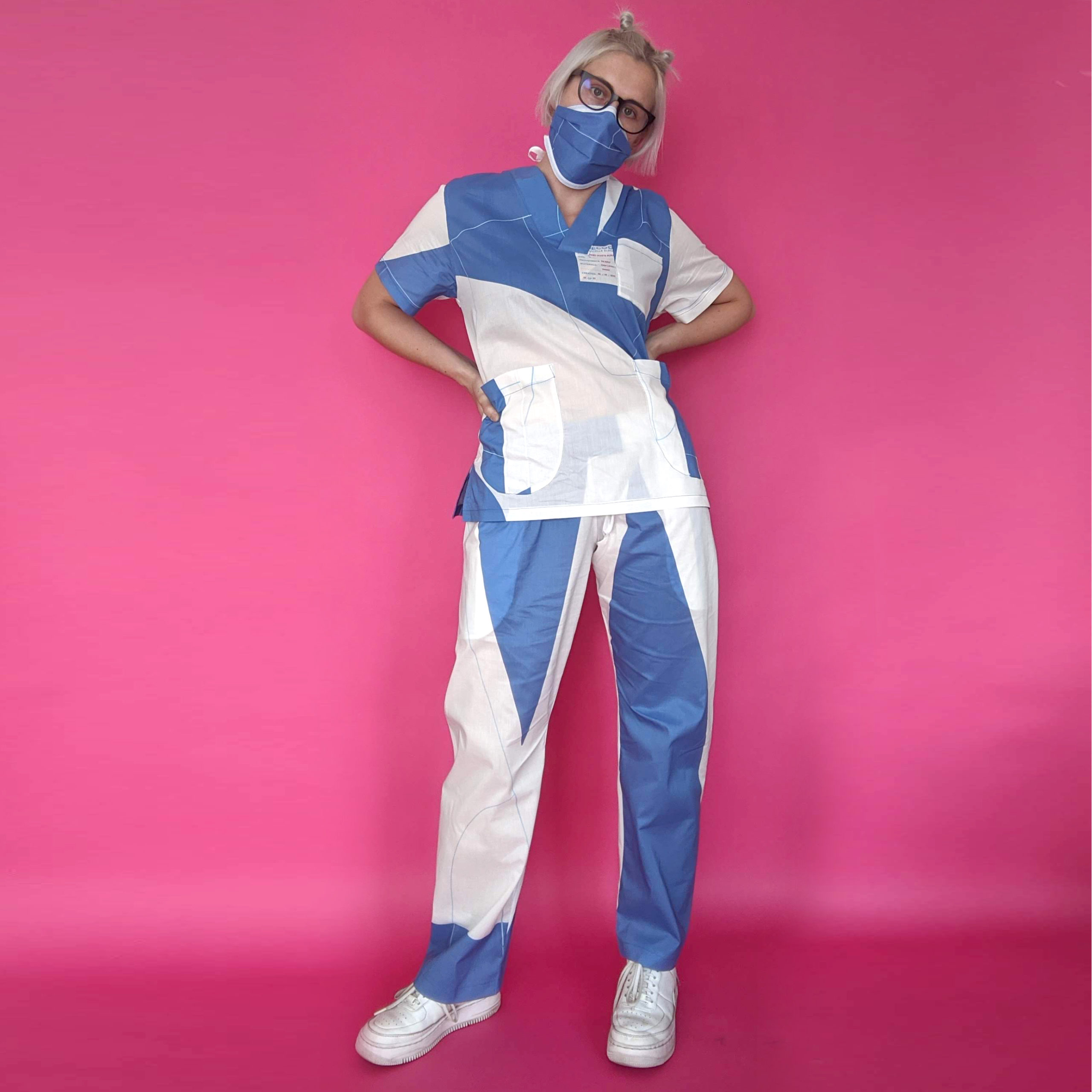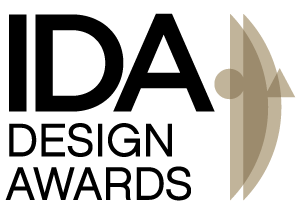
DANIELLE ELSENER – DECODE
DANIELLE ELSENER
DECODE
Fashion Design Grant: ($2,000)
Fashion designers were invited to create fashionable and reusable masks or protective gear to help stop the spread of the virus.
What do you see as the strengths of your winning project and what does this award mean to you personally?
The Zero Waste Scrub Set was an amazingly fast, concise, useful project that really gave the power of PPE to the hands of the people. During the time of Covid it was becoming increasingly more difficult to find scrubs , especially size inclusive scrubs, and I wanted to do something to help. I used my design system to create these scrubs and made them available for anyone to download for free.
Winning this award gave so much more strength to the notion of Zero Waste Design working in a practical setting, and amplified the message to lengths I couldn’t imagine.
What impact has winning this IDA Covid19 Design Innovation Grant had on your career/opportunities?
Winning the IDA Covid-19 Design Grant has propelled my conversation around Zero Waste Design into the forefront of many minds. The reaction the project has gotten is breathtaking and I’m so humbled by the press and feedback that it’s gotten. I graduated from the Royal College of Art right around the same time and it really has created an amazing platform to get the word out about my design system as I continue my career!
How/when did you discover that you wanted to work in design?
I started sewing when I was 11. I was introduced to the world of design through quilting at a retreat in upstate NY with my Aunt. The women at this retreat were all shocked by the 11 year old kid whizzing away at the sewing machine. Growing up I was always too impatient to be taken to the store to buy patterns or fabric, so I would use whatever was around me. Recyclable bags, curtains, old sheets, you name it. This definitely led to my innovation for fabric consumption and pattern making! I learned that I could “do design” in High School. We had a great arts program and I was lucky enough to take some fashion courses before deciding what I wanted to do in College. It was at Savannah College of Art and Design that I discovered the work of Holly McQuillan and Timo Rissanen and was immediately hooked into the world of Zero Waste Design.
What do you think are the biggest challenges and opportunities in your career/industry now?
One of the biggest challenges we face in the fashion industry is getting consumers to care, listen, and take action. The fashion industry is the second-most polluting industry on the planet, and there needs to be change. This is a tough reality to face, so it is up to us as designers to create conversations that are engaging, easy to facilitate, and fun. Starting conversations is one of the most impactful things we can do. The industry will pivot to react to what consumers want.
What would be your dream design project?
My dream is to create a complete Zero Waste Design World. This includes creating my own garments, tools, and factory, while working with companies to create complete sustainable solutions. I’m working with a few well known American brands to create Zero Waste Strategies, and would love to work with some of my design icons, including Sacai, Rei Kawakubo, and Issey Miyake. Working with such advanced designers would show that Zero Waste Design can have a full range of aesthetic and design sensibilities.
What’s your creative process and what creative software do you use?
I end up spending a lot of time staring at patterns! I have always loved puzzles and problem solving, and this has absolutely developed with my design thinking throughout my career. Creating Zero Waste Designs is basically solving a 3D puzzle. I lay out standard pattern blocks, usually digitally in Illustrator, and look for commonalities in shapes. I look for where a seam could potentially be added or taken away, where certain curves could be augmented to fit other curves. This leads to TONS of trial and error of moving shapes around on a screen. I have been using Clo 3D software as of late to test out samples without having to create them in the real. This cuts down on sample making expenses and waste.
What kind of questions do you ask before beginning a design project? What piece of information is of utmost value?
At the beginning of a project I take a ton of time doing research into the “why” behind its existence. This then gets broken down into its components, which makes it a great playing field for creative solutions. For example, when I’m designing a zero waste t-shirt I list out every single component I can think of that makes it a t-shirt, both literally and historically. What out of those components is intrinsic to it being a t-shirt? What can be played around with? What is the core 15% that makes it the item that we all recognize? This combined with the boundaries of creating something without waste makes it an incredibly fun, yet challenging, process.
What kind of culture or structure needs to exist to foster successful team collaboration?
A culture of sharing and openness is the #1 thing necessary towards creating a successful collaboration. Willingness to have fun and enjoy the process is also up there! I try to have these components in all of my work to keep the conversations interesting and the quality of work high.
How do you deal with feedback?
I thrive on feedback! It’s intrinsic to my practice. I live to create designs that are functional, understandable, desirable, and accessible. The design tools I make require the same qualities. The open source zero waste scrub pattern I created was an amazing resource for getting loads of feedback. I created and uploaded the patterns quite quickly as an exercise in immediacy, and I didn’t have time to go through my usual vetting process. The first home sewers that made the garments gave great feedback if something wasn’t working, if a notch didn’t line up correctly, if the instructions were unclear, etc. I was updating the patterns in real time, allowing for collaboration from around the world.
What are you working on, what is in the pipeline for you?
I’m working on creating a holistic Zero Waste Design System, A020, that has been developing over the last few years. I create tools and workshops that allow anyone to understand how zero waste design works. I also am working towards creating a zero waste factory and plans for restructuring existing production plans for an enhanced sustainable work flow. I have been working with a few brands on collaborations that take this process and utilize it is a commercial setting. It’s so exciting and I can’t wait to share more!

IDA COVID-19 DESIGN INNOVATION GRANT
The International Design Awards and European Product Design Awards jointly launched the Covid-19 Design Innovation Grant in an effort to support the global effort to find solutions in tackling some of the crucial issues and problems relating to the global Coronavirus pandemic.
